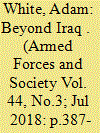|
|
|
Sort Order |
|
|
|
Items / Page
|
|
|
|
|
|
|
| Srl | Item |
| 1 |
ID:
160622


|
|
|
|
|
| Summary/Abstract |
Through the lens of veterans studies, we know a great deal about the fate of those soldiers who have recently returned home following a period of deployment in Iraq and Afghanistan, yet counterintuitively we know nothing about the plight of the private military contractors who worked alongside them. Addressing this blind spot, the article explores the socioeconomic trajectories of “private military veterans” from a life-course perspective. Specifically, it addresses three questions regarding their status in the civilian labor market. What occupations do they work in? To what extent do they work in similar occupations to public military veterans? To what extent do they work in similar occupations to the general population? Focusing on the U.K. case, it reveals that private military veterans are significantly overrepresented in the “protective service occupations,” where they primarily work in the private security industry, and offers a multilayered explanation for this distinctive clustering effect.
|
|
|
|
|
|
|
|
|
|
|
|
|
|
|
|
| 2 |
ID:
042505


|
|
|
|
|
| Publication |
New York, Harper & Row, Publishers, 1972.
|
| Description |
xviii, 619p.
|
|
|
|
|
|
|
|
|
|
|
|
Copies: C:1/I:0,R:0,Q:0
Circulation
| Accession# | Call# | Current Location | Status | Policy | Location |
| 009584 | 331.10973/LEV 009584 | Main | On Shelf | General | |
|
|
|
|
| 3 |
ID:
110506


|
|
|
|
|
| Publication |
2011.
|
| Summary/Abstract |
This paper assesses the applicability of two alternative theories in understanding labor market developments in China: the classical view featuring a Lewis turning point in wage growth versus a neoclassical framework emphasizing rational choices of individuals and equilibrating forces of the market. Empirical evidence based on multiple data sources fails to validate the arrival of the Lewis turning point in China, showing continuous and coordinated wage growth across rural and urban sectors instead. Consistent with the neoclassical view, we find that rural workers expanded off-farm work when mobility restrictions were lifted, interprovincial migration responded to expected earnings and local employment conditions, and returns to education converged gradually to the international standard. These findings suggest major progresses in the integration of labor markets in China.
|
|
|
|
|
|
|
|
|
|
|
|
|
|
|
|
| 4 |
ID:
097719


|
|
|
|
|
| Publication |
2010.
|
| Summary/Abstract |
Existing research on foreign direct investment (FDI) focuses on how politics influences the supply of FDI inflows. In this article I shift focus to the demand for FDI inflows within recipient countries by examining individual preferences for FDI. I argue that FDI preferences are largely a function of FDI's effects on income. FDI raises wages, especially those of skilled labor because foreign firms require more highly skilled labor than their local counterparts. Accordingly, support for FDI should increase with respondents' skills. Using three years of extensive public opinion data from eighteen Latin American countries, I provide robust evidence that preferences are consistent with FDI's effects on income. There is relatively little support for alternate explanations including concerns about job security, opposition to privatization, and the socializing effects of higher education on economic policy preferences.
|
|
|
|
|
|
|
|
|
|
|
|
|
|
|
|
| 5 |
ID:
087702


|
|
|
|
|
| Publication |
2009.
|
| Summary/Abstract |
For most of this decade, sub-Saharan Africa
enjoyed a period of sustained economic
growth such as it had not seen since the
1960s. Until the global economic crisis hit, countries
across the continent benefited from a salutary
combination of favorable commodity prices,
substantial international debt reductions, and,
in numerous cases, more prudent fiscal management.
Of course the improved performance, which
included continent-wide economic growth of 4.7
percent between 2003 and 2008, was aided in particular
by a nearly 300 percent increase in world
petroleum prices over the period. But even when
Africa's major oil-based economies are removed
from the equation, the continent still showed
commendable growth-reaching 4.9 percent in
2008, for example.
For Africa's workforce, however, the positive
impact of these developments can be difficult to
discern. Indeed, despite the impressive macroeconomic
performance, economic diversification
has not occurred on a meaningful level. Poverty
remains stubbornly entrenched on the continent.
Unemployment, though improved in many countries,
remains very high. And informal markets
are still widespread.
|
|
|
|
|
|
|
|
|
|
|
|
|
|
|
|
| 6 |
ID:
165377


|
|
|
|
|
| Summary/Abstract |
Refugee response planners no longer frame Syrian refugees merely as objects of humanitarian care. Increasingly they are portrayed as enterprising subjects, whose formal integration into labor markets simultaneously can create self-sufficient actors and cure the economic woes of host countries. However, bringing together humanitarian and economic agendas is not an easy task. This article analyzes the contradictions and frictions that have emerged in the process of implementing the Jordan Compact, a political commitment to integrate Syrian refugees into the formal Jordanian labor market, and which is supposed to showcase such win-win strategies. It argues that the Jordan Compact should be seen as a policy model that has achieved enough consensus and incorporated enough disparate objectives to be labelled a ‘policy success.’ Yet, central actors have neglected core features of Jordan’s political economy and labor market, and/or the lives and survival strategies of refugees, such that their radical blueprints of transformation have been disrupted. Despite the widespread commitment to the scheme, it is thus unlikely that the Jordan Compact will both reinvigorate the Jordanian economy and offer Syrians the prospect of a dignified, self-sufficient life, an important lesson for comparable schemes being rolled out across the globe.
|
|
|
|
|
|
|
|
|
|
|
|
|
|
|
|
| 7 |
ID:
153623


|
|
|
|
|
| Summary/Abstract |
Economic studies of military manpower systems emphasize the advantages of voluntarism under all but the most total threats, but this explains neither the persistence of institutionalized conscription in many states nor the timing of shifts from such conscription systems to volunteer militaries. Traditional explanations focus on external threat levels, but this has also proven unsatisfying. We theorize that threat variables establish the state’s baseline need for manpower, but structural economic variables determine whether the necessary manpower can be more efficiently obtained by conscription or voluntarism. Using a new data set of 99 countries over 40 years, we find that states with British origins are less likely and those experiencing greater external threat are more likely to employ conscripts. Most importantly, states with more highly regulated labor markets are more likely to employ conscripts, which suggests that, controlling for a number of relevant factors, labor markets matter in military manpower decisions.
|
|
|
|
|
|
|
|
|
|
|
|
|
|
|
|
| 8 |
ID:
146107


|
|
|
|
|
| Summary/Abstract |
Crowdsourcing platforms offer a source of inexpensive data for research. At their fingertips, researchers have a round-the-clock workforce to fill out surveys, participate in experiments, and content-analyze text, among other tasks that generate social science data and help support research. Thanks to its low cost and convenience, crowdlabor has quickly and uncritically become a mainstream tool in our discipline. While such platforms have been evaluated on their aptness to generate high-quality data, surprisingly little has been said about the economic or political implications of their usage. Among other aspects, this article problematizes the “state of legal exception” in which crowdlabor markets operate, their tendency to rely on a pool of economically vulnerable workers and the asymmetrical employment relations they create. Rather than offer an easy solution, I aim to open up a conversation about this unique set of challenges in order to acknowledge and address them.
|
|
|
|
|
|
|
|
|
|
|
|
|
|
|
|
|
|
|
|
|